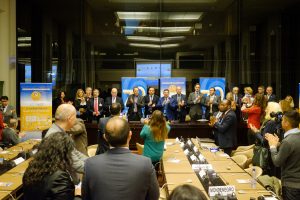Diplomats, media, NGOs, Religions gathered in Geneva to celebrate the Universal Declaration. Bitter Winter was there, to bear witness about the struggle for human rights in China.
Marco Respinti
 The Universal Declaration of Human Rights, signed on December 10, 1948, turned 70 on Monday. The anniversary was celebrated all over the world, but the “home” of the Declaration is the Palais des Nations in Geneva, the headquarters of the United Nations’ Human Rights Council.
The Universal Declaration of Human Rights, signed on December 10, 1948, turned 70 on Monday. The anniversary was celebrated all over the world, but the “home” of the Declaration is the Palais des Nations in Geneva, the headquarters of the United Nations’ Human Rights Council.
The Palais des Nations hosted the event 70th Anniversary of the UDHR: A Commitment from Civil Society, co-hosted by the Missions to the United Nations Offices in Geneva of Estonia, Finland, and the Philippines, and by 20 different NGOs, including CESNUR, the publisher of Bitter Winter. The Estonian Ambassador to the U.N. in Geneva, Mr. Andre Pung, opened the event, followed by the Deputy Ambassadors for Finland and the Philippines.
The event, which took place in a fully packed room, focused on how the civil society promotes the awareness of the Universal Declaration, rather than on specific examples of how the Declaration is violated. However, in the present world situation, it was unavoidable to mention some of the most blatant cases of violation.
Massimo Introvigne, editor-in-chief of Bitter Winter, mentioned the importance of the General Comments issued by the U.N. Treaty Bodies for interpreting the Universal Declaration. “We try to promote awareness and use in legal cases, of one specific General Comment, no. 22, of July 30, 1993,” Introvigne explained. The comment states that,
Article 18 protects theistic, non-theistic and atheistic beliefs, as well as the right not to profess any religion or belief. The terms “belief” and “religion” are to be broadly construed. Article 18 is not limited in its application to traditional religions or to religions and beliefs with institutional characteristics or practices analogous to those of traditional religions. The Committee therefore views with concern any tendency to discriminate against any religion or belief for any reason, including the fact that they are newly established, or represent religious minorities that may be the subject of hostility on the part of a predominant religious community.
Introvigne mentioned three examples how General Comment 22 has guided CESNUR to advocate for religious liberty of new and non-conventional religious movements.
“First, it helps protecting groups that are discriminated or persecuted by those who claim that they are ‘not genuinely religious.’ …GC 22 tells us that ‘institutional characteristics or practices analogous to those of traditional religions’ or even traditional ‘theistic beliefs’ are not required to be protected by Article 18.
Second, it reminds to us scholars, but also to media and authorities, that spreading fake news is a form of violence and discrimination. They are often used to justify physical violence and persecution. Examples are many, but accusations that Jehovah’s Witnesses stockpile weapons or that The Church of Almighty God commits murders have been debunked by scholars as fake news and blatant lies.
Third, GC 22 implies that hostility, fake news and violence against new religious movements may come from both public and private actors, from states, anti-cult organizations (which have often plays a nefarious and even criminal role) and also “predominant religions” intolerant of competition. To remain within the examples already mentioned before—of course, there are many others—we see (…) rival religionists cooperating with state actors in propagating fake news about The Church of Almighty God and justify its persecution in China, which by the way is one of the most massive instances of religious persecution in the world today.”
Introvigne also mentioned how paradoxical and sad it is that on the very day of the anniversary of the Universal Declaration, China is cracking down on the Early Rain Covenant Church, one of the most well-known house churches in the country.
Rosita Šorytė, associate editor of Bitter Winter, spoke on behalf of ORLIR, the International Observatory of Religious Liberty of Refugees, and offered a survey of the main challenges to human rights in the world today. Speaking of religion-based refugees, she stated that, “The fathers of 1948 Declaration believed that the persecution of religion was a thing of the past. Unfortunately, this was just a noble illusion. No persecution is purely religious, and very often questions of religion mask questions of power and politics. However, as we speak, religion is a component of massive persecutions generating thousands of refugees: Muslims, such as the Rohingya from Myanmar, the Ahmadis from Pakistan, and the Uyghurs from Xinjiang; Christians, from the Middle East but also from China where members of The Church of Almighty God and of some house churches are arrested by the thousands; Yazidis from Iraq, Jehovah’s Witnesses from Russia, and many others. States are right when they are concerned with false refugees who are in fact simple economic immigrant, but they are wrong when they refuse to protect genuine refugees escaping religious persecution or war.”
“Our experience teaches us, concluded Introvigne, that the sentence ‘there is nothing to do’ is always wrong. There is a lot to do. Since fake news are today the main enemy of human rights, scholars, responsible media and NGOs can cooperate not in screaming about fake news—something now at risk of becoming repetitious and boring—but in lightning the candle of reliable information to dispel the darkness of propaganda.” This is what Bitter Winter tries to do every day.
Source : https://bitterwinter.org/70th-anniversary-of-human-rights-declaration/


